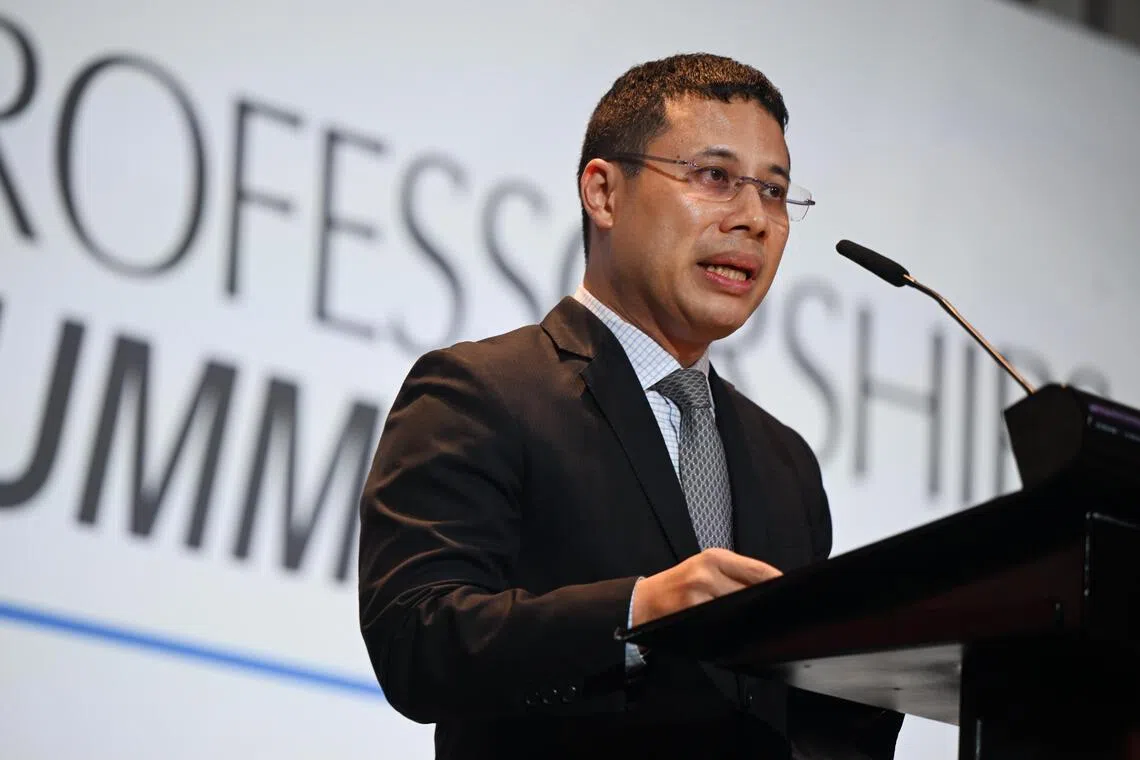More will be done to support teachers, including managing workload: Desmond Lee
Sign up now: Get tips on how to help your child succeed

Education Minister Desmond Lee speaking at the National Institute of Education’s Professorships Summit on Oct 8.
ST PHOTO: AZMI ATHNI
- MOE will reduce teacher workload by strengthening admin teams, using AI tools and simplifying procurement to address stress from administrative duties and marking.
- Singapore aims to shift from an "academic arms race" by de-emphasising exams, promoting diverse strengths and enhancing character and social-emotional learning.
- Education will prepare students for the AI age, teaching them to use AI as a tool while fostering critical thinking, lifelong learning and independent skills.
AI generated
SINGAPORE - To better support teachers, the Ministry of Education (MOE) and school leaders will find more ways to manage their workload and help them to grow professionally, said Education Minister Desmond Lee.
It will also “redouble efforts” to attract and retain good educators to have a strong education fraternity, he said.
Results from a global study by the Organisation for Economic Cooperation and Development (OECD) show that teachers here feel valued and experience high job satisfaction, Mr Lee said on Oct 8 at the National Institute of Education’s (NIE) Professorships Summit held at Marriott Tang Plaza Hotel.
Singapore’s teachers also have a high workload compared with their peers in other systems, in terms of non-academic tasks and online teaching, he added.
The Teaching and Learning International Survey 2024 report, released on Oct 7, found that teachers here work an average of 47.3 hours a week
Certain workload-related factors, such as administrative duties and marking, were identified by teachers here as their main sources of stress.
“We recognise these issues and have made moves to better support our teachers, including to manage their administrative workload,” said Mr Lee. These measures include strengthening school administrative teams and introducing artificial intelligence (AI) tools.
“We have made AI and other digital tools available to teachers, so they can complete tasks more quickly. For example, using AI to help draft letters to parents and prepare initial first-cut drafts of students’ testimonials.”
MOE has also piloted procurement approaches to simplify processes like organising camps and making purchases, he said. These will be rolled out to more schools when ready.
Mr Lee said: “This is the beginning, and we must do more.”
NIE will play a central role in these efforts as the education system transforms, he said.
Over the past decades, NIE research has helped drive innovation and reform in the profession, Mr Lee said, enabling educators to adopt new and effective teaching methods.
The Oct 8 summit, which focused on the future of education and education research, was held to mark NIE’s 75th anniversary. It was attended by more than 300 academics and educators.
In his opening remarks, Mr Lee laid out the shifts in education reforms that Singapore wants to take on over the next few years.
“In today’s world, education is not just about learning and preparing to do well in milestone exams, believing that these will unlock entrance to university or job placements,” he said.
Children must be equipped with important skills such as critical thinking, the agility to keep learning through life, as well as communication and empathy – these are not so easily replaced by technology, said Mr Lee.
Singapore’s education system, he added, must also be broad enough for all young people to develop based on their own strengths, learning needs and speeds.
“We want to give space for our children to love learning and be creative, rather than chasing a narrow definition of academic success,” he said.
MOE has removed some school exams and implemented full subject-based banding, said Mr Lee. But society has not entirely moved away from seeing education as an academic “arms race”.
An “excessive fixation” on academic results is counterproductive, he said. “So, we will do more to move away from this unhealthy dynamic.”
MOE is studying how to reduce the high stakes of exams while keeping children motivated to learn, he said. It is also looking to strengthen character education and social-emotional learning, and to amplify students’ diverse strengths while enhancing independent learning and adaptive thinking.
The ministry is also exploring how to provide opportunities for all children regardless of their educational needs or family backgrounds, and encourage interaction to prevent societal divides.
At the same time, teaching and learning will transform to prepare students for the age of AI, Mr Lee said, so they know how to use it as a tool without being overly dependent and continue to learn deeply.
“These are major moves and we will work closely with our teachers, researchers, students, parents and stakeholders to study and develop them carefully,” he said. “We will need our full education fraternity on board, including tapping NIE with your strong research capabilities and ability to connect this to pedagogy in practice.”
Six overseas academics holding NIE professorships, together with NIE director Liu Woon Chia, took part in a panel discussion on topics ranging from AI to inclusivity in education to lifelong learning.
The panellists were: Professor of Educational Policy and Practice Chris Chapman, Professor of Education David Kirk, Professor of Early Childhood Education Robert Pianta, Professor of Special Education Meghan Burke, Professor of South-east Asian Studies Arndt Graf, and Professor of Learning and Technology Allison Littlejohn. The panel was moderated by Mr Mubin Saadat, deputy opinion editor at The Straits Times.
Prof Chapman, from the University of Glasgow, said that rapid technological change, combined with global challenges such as climate change and geopolitical instability, has left the world in a more “precarious and uncertain position”.
In this environment, there must be a focus on core values and leadership that can drive change rather than relying on the past, he said. “This means really thinking about the types of leadership that are going to be needed to take our education systems forward in this new world.”



